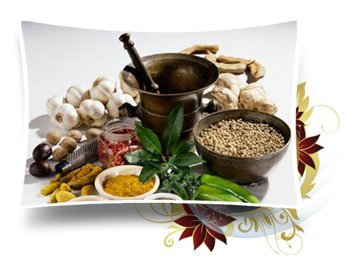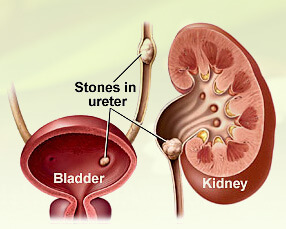
Ayurvedic Kidney Stone Treatment in Kolkata
Kidney stones (renal lithiasis) are small, hard deposits that form inside your kidneys. Kidney stones are made of mineral and acid salts. Kidney stones have many causes. Kidney stones form when the urine becomes concentrated, allowing minerals to crystallize and stick together. Passing kidney stones can be painful. The pain of a kidney stone typically starts in your side or back, just below your ribs, and moves to your lower abdomen and groin. The pain may change as the kidney stone moves through your urinary tract. Kidney stones usually cause no permanent damage. Apart from pain medication and drinking lots of water, treatment is often unnecessary. However, treatment may help prevent recurrent kidney stones in people with increased risk. Renal calculi are stones in the kidneys or ureters that have been formed by precipitation from a substance in the urine. Although their composition is sometimes due to a specific cause, in the majority of cases there is no identifiable underlying cause. Because concentrated minerals in the urine can crystallize and form hard stones, especially when there is insufficient fluid in the urinary tract, mild chronic dehydration may play a part in stone formation. Approximately 70% of kidney and ureteral stones are composed mainly of calcium oxalate and/or phosphate. Oxalate is naturally present in the urine as an end product of body metabolism. Higher levels of oxalate in the urine may be the result of a diet high in oxalic acid (rhubarb, leafy vegetables, coffee). When combined with calcium, oxalate forms a salt that dissolves poorly. Therefore, an abnormally high level of oxalate in the urine encourages stone formation. Symptoms of renal stone vary according to the site and size of the stone. Small stones in the kidney may cause no symptoms until they start to pass down the uretus. The resulting pain (renal colic) is acute, sharp, and intermittent. Starting in the flank, the pain moves toward the groin. The pain may be so severe that it causes nausea and vomiting. Blood may be noted in the urine (hematuria). Ayurvedic Concept for Renal Stone Healthy function of kidneys and urinary tract plays an important role in the maintenance of other body functions. Renal stones (Calculus or lithiasis), known as "Ashmari" in Ayurvedic science, is one of the most common problems of the urinary tract. It occurs more frequently in men than in women. Urinary calculus is a stone-like body composed of urinary salts bound together by colloid mixture of organic materials. It consists of a nucleus, around which concentric layers of urinary salts are deposited. All the biological Humors (Doshas), i.e. Vata (Air), Pitta (Fire) and Kapha (Water), are involved in the pathogenesis of calculus. If the Vata (Air) dries up the urine in the bladder along with the semen, Pitta (Fire) and Kapha (Water), then gradually form a calculus. A calculus is just like a stone and may be of the appearance of either mulberry oxalate stone or it may be a smooth and three layered stone (Uric acid stone), or a soft stone (Phosphatic stone). When it passes in the urinary tract, it causes obstruction in the flow of urine and produces pain in the course of the urinary tract. This causes pain in the perineum, phallus and hypo gastric region and the stream of the urine gets split. The stone, when broken up by Vata (Air), forms sand which passes out through the urinary
|
Contact us!
We are happy to help you..
Book Appointment
- Ultadanga Book appointment
- Gariahat Book appointment
- Howrah Book appointment

Subscribe to our Newsletter
Book Appointment
-
Ultadanga
 (0)9831775590
Book appointment
(0)9831775590
Book appointment
-
Gariahat
 (0)9831775590
Book appointment
(0)9831775590
Book appointment
-
Howrah
 (0)9831775590
Book appointment
(0)9831775590
Book appointment
Call
-
Ultadanga
 (0)9831775590
(0)9831775590
-
Gariahat
 (0)9831775590
(0)9831775590
-
Howrah
 (0)9831775590
(0)9831775590



 A Renal Stone can form when substances such as calcium, oxalate, cystine, or uric acid are at high levels in the urine. Stones can also form if these substances are at normal levels. The substances form crystals, which become anchored in the kidney and gradually increase in size, forming a kidney stone. Typically, the stone will move through the urinary tract and is passed out of the body in the urine. A stone may cause pain if it becomes stuck and blocks the flow of urine. Large stones do not always pass on their own and sometimes require a procedure or surgery to remove them.
A Renal Stone can form when substances such as calcium, oxalate, cystine, or uric acid are at high levels in the urine. Stones can also form if these substances are at normal levels. The substances form crystals, which become anchored in the kidney and gradually increase in size, forming a kidney stone. Typically, the stone will move through the urinary tract and is passed out of the body in the urine. A stone may cause pain if it becomes stuck and blocks the flow of urine. Large stones do not always pass on their own and sometimes require a procedure or surgery to remove them.